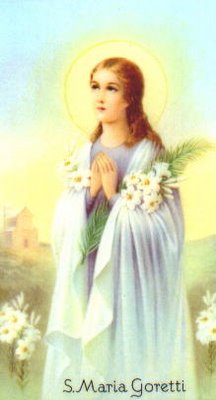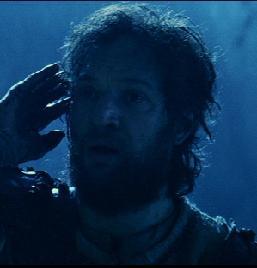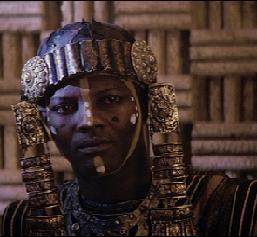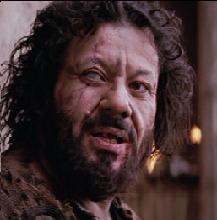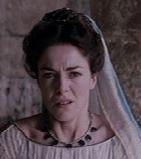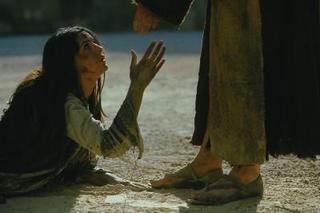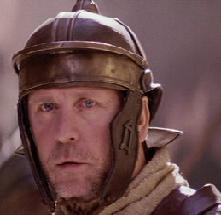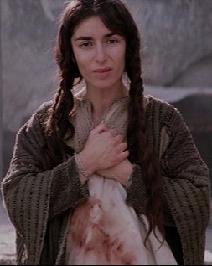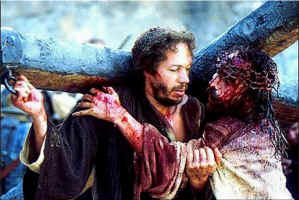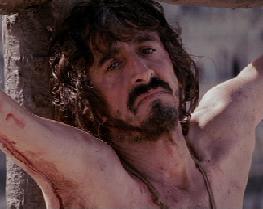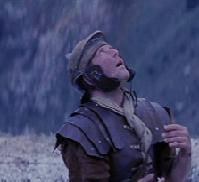
For this post, we're jumping way back to the beginnings of Christianity again, to discuss the big kahuna himself, St. Peter, the leader of the Church and first Pope.
Now, Peter wasn't born with that name. Instead, his parents named him Simon. And Simon was a fisherman, who made his living catching and selling fish in his hometown of Capernaum. But I suspect he wasn't all that great of a fisherman, since at least twice, the Gospels tell us that he spent the whole night fishing, and didn't catch a thing!
After one of these profitless nights, a tired Simon and his colleagues were sailing to the shore of the Sea of Galilee, and on the shore, they see a Man, talking to a crowd of people who are swarming so close to Him that they're almost pushing Him into the water. This Man turns to Simon, and says, "Simon, can I borrow your boat?" Simon lets this Man up so that He can continue to preach and teach about God's love and His Kingdom. Simon listens intently to what this Man has to say, and after He is done His message, Simon makes sure to introduce himself. Jesus says to him, "Hey, let's go fishing!" Simon, tired from the night's work, and knowing that the middle of the day is just a bad fishing time, was probably a little doubtful: "Actually, Jesus, if it's all the same to you, I'd rather go home to bed. I was out all night and didn't catch anything. Do You mind?" To which, Jesus replies, "Come on, it'll be fun!"
So Simon sets out with Jesus for some highly irregular fishing--and it will only become more irregular from this point out! In the middle of the sea, Jesus says to Simon, "Throw out your nets!" Simon again reminds Jesus that fishing is terrible at this time of day, but follows Jesus' instructions anyway. And after catching nothing all night, in peak fishing hours, suddenly now, in the middle of the day, Simon's nets are so full that they're breaking from the catch!
Realising that this just isn't normal, Simon turns to Jesus and says, "Away from me, Lord, for I am a sinful man!" Jesus, instead, lifts Simon up and says, "No longer will you catch fish, but from now on, you will catch men!" And from that point, Simon gave up his fishing business and accompanied Jesus as He taught about the Kingdom of God, and Simon himself preached and did many signs and wonders.
A little while goes by, and Jesus pulls Simon and the other disciples aside for a pop quiz. There had been a lot of questions about who exactly Jesus was, and so He put those questions to His crew: "Who do people say that I am?" Some replied that people thought He was Elijah come back from heaven. Others said He was a great prophet. Some didn't like Him so much, and thought He was a bit of a wing-nut. So Jesus brought it home: "Who do
you say that I am?" Simon, who was one of those kids who always answered without sticking up his hand, blurted out, "You are the Christ, the Son of the Living God!" And, much to his surprise, Jesus replied by saying, "Hey, you're right!" Jesus continued, saying, "This answer didn't just come from your own mind, either, but God Himself revealed this to you! Because of this, I'm renaming you Peter, the Rock, and on this Rock I will build My Church!" Peter was on top of the world!
But the very next moment, Jesus said, "But first, people are going to begin to hate Me, and they'll take Me away and crucify Me! But I will rise again on the third day." I guess Peter missed the last part, because he immediately interrupted, saying, "What?! There ain't no way, Lord! That ain't gonna happen!" Jesus got right in Peter's face and said, "Get behind Me, satan. You're not focussing on what God wants, but on what
you want!" Now, of course, Jesus wasn't calling Peter the devil, but in calling him satan, which means "adversary" or "opponent", Jesus was showing that Peter's mindset was in direct opposition to the will of God. Peter went from a big high, to a very deflated low. And much of the Gospel's record of Peter was a repeated loop of big high, big low as he served God well, and then followed it up with sometimes incredible stupidity.
Perhaps the most famous case of Peter's stupidity was at the Last Supper. Jesus again told them of His impending Crucifixion, so that His disciples would not need to be confused as well as afraid, but know what the plan was. He told them that when it happened, they would all leave Him and scatter. Peter, again speaking out boldly, said, "Never, Lord! Even if all these others leave You, I never will! I'm willing to even
die with You!"
I'm grateful that Jesus is so infinitely patient with us. I'm sure He sighed and shook His head, and then told Peter, "I'm telling you, Peter, this very night you will deny that you know Me
three times before the rooster crows." And of course, Peter rejected that! "Nuh uh! No way! No!"
Afterward, they went out to the Garden of Gethsemane to pray. Well, Jesus prayed. Peter, James, and John fell asleep. Three times. Finally, Jesus (again, eternally patient) wakes them to tell them that the mob is here to arrest Him. Peter, again trying to be the heroic Rock, takes out a sword and starts swinging. He chops off one of the guards' ears! Jesus again, shakes His head and says, "Oh Peter, didn't I tell you not to do that? This
has to happen!" With that, Jesus
heals the ear of the guard! Meanwhile, Peter and the other disciples take off.
But Peter doesn't go too far, but rather, he follows at a safe distance. He hangs around outside of the courtroom, trying to hear the results of Jesus' trial. As he stands there, someone approaches him, and asks whether he was one of Jesus' disciples. "No way! I got no idea what you're talkin' about!"
A little later, someone else asks the same question, noting that Peter's accent was the same as Jesus' and the other disciples. Again, Peter denies knowing Jesus. Finally, a little servant girl sees him and says, "You were with Jesus!" And big, tough, rocky Peter is so intimidated by her that he
curses and swears and denies that he knows Jesus! Then the rooster crowed, and Peter remembered Jesus' words, and ran off weeping.
We know the story--how Jesus was crucified, died, and was buried. On the third day, He rose again, and when, that morning, Mary Magdalene and the other women were going to the tomb to properly embalm Him, an angel was waiting there for them! The angel told them that Jesus had risen, and to go and tell the Disciples--
and Peter--that Jesus would meet them in Galilee!
Peter, hearing the news, says to his friends, "Galilee, eh? I'm going fishing!" And the disciples joined him, as he took his boat out of retirement and cast out on the Sea of Galilee that night. They fished all night, and, once again, caught nothing! As they were heading into shore, there was a man walking on the beach. He hollered out to them, "Hey! Catch anything?" Peter probably grumbled a no, and the man yelled again, "Throw out your nets on the
other side of the boat!"
Now, I don't know if you know anything about fishing. I've fished a few times, catching nothing, and Jesus' words will come back to me, and I'll try tossing out my line on the other side of the boat. And I
still catch nothing! Why? Because fish aren't hiding on the other side of the boat, laughing at you as you cast out on the one side. That's just not how it works. They're not that smart.
So to Peter, this advice had to sound incredibly useless, but he remembered a similar incident of receiving bad fishing advice that paid off big, so he looked at John and said, "Hey, what the heck?" When they did, they caught a huge amount of fish! The Gospel of John numbers them at 153! And this time, the nets
didn't break! When John saw the miracle, he says to Peter, "Hey! It's Jesus!" Peter grabs his coat, puts it on, and leaving everyone else to finish hauling in the fish, he jumps out of the boat and swims to shore. Now, I wouldn't be putting more clothes
on before I jump in a lake, but hey, it's Peter.
When he gets to shore, Jesus takes him for a walk, and begins talking to him. He asks Peter if he loves Him, to which Peter replies, "Yes, I love you, Lord." Jesus says to him, "Feed My sheep." A little later, Jesus asks again, "Do you love Me?" Peter again answers, "Yes Lord, You know I love You." Jesus says to him, "Feed My lambs." A third time, Jesus asks Peter, "Do you love Me?" Peter's a little upset about being asked a third time, and replies, "Lord, You know everything. You know I love You!" Jesus says, "Tend My sheep."
In doing this, Jesus gave Peter the opportunity to make up for denying Him three times, and each time, Jesus reaffirms His plan for Peter, to lead the Church. Jesus had compared Himself to a Good Shepherd, who lays down His life for the sheep. On the Cross, He had done just that. Now, it was Peter's turn to take over caring for those very sheep.
Afterwards, on the Day of Pentecost, the Disciples were filled with the Holy Spirit. Peter took up that leadership role, preaching Christ to the crowds, and in that first sermon,
3000 people converted to Christianity! And Peter continued to serve and to lead the Church, travelling abroad and beginning churches. Finally, he went to Rome, and began and led the church there. In the 60s, the Emperor Nero came to power, and he hated the Christians. He also seemed to love fire, and parties. And at one such party, he burned down half the city of Rome. When his enemies tried to put the blame on him, though, he said, "Wasn't me! It was, uh, the Christians! Let's kill 'em!" And so a terrible state-sponsored persecution of the Church began, killing many Christians (Nero would often light their bodies on fire as streetlights--big surprise).
The Christians in Rome pleaded with Peter to flee for his safety, since, as the leader of the Church, Nero would certainly be coming after him. And, heeding their advice, Peter fled. But as he left Rome, St. Ambrose tells us that he had a vision, and in it he saw Jesus, carrying His cross back toward Rome. Peter asked Jesus, "Lord, where are You going?" Jesus replied, "I am going to Rome, to be crucified again." Then the vision ended, and Peter knew that Jesus wasn't really going to be crucified again, but that he, as Jesus' representative, needed to return to Rome and continue to lead the Church until whatever happened, happened. So Peter did just that.
When the Romans caught up with Peter, and arrested him, he was slated to be crucified in the Colosseum. But Peter refused that death, saying that he was unworthy to die in the same way that His Lord had. So they crucified Peter
upside down, and by his courageous death, he gave glory to God.
St. Peter's story is encouraging to us today. Through it we know that God is ever-patient with us, and always forgiving. Even when we screw up numerous times, God's plan is still true for us, and if we are willing to return to Him, we will find forgiveness and restoration, just as Peter did; and ultimately, our lives and our deaths will be used to the glory of God!
Amen!
Labels: Conversion, Holy Spirit, Martyrs, Saints, St. Andrew's, The Church
 Since Remembrance Day is coming up, I figured it would be good to relate the story of a Saint who played a large role in World War II.
Since Remembrance Day is coming up, I figured it would be good to relate the story of a Saint who played a large role in World War II.